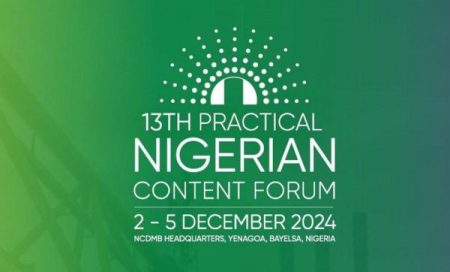 05 October 2013, Sweetcrude, Lagos – I posted a discussion on a LinkedIn Group that focuses on the Nigerian Oil and Gas Industry Content Development, NOGICD, Act: “What Nigerian Content Success Stories can we expect from the $15billion Egina Project and who should be responsible?”
05 October 2013, Sweetcrude, Lagos – I posted a discussion on a LinkedIn Group that focuses on the Nigerian Oil and Gas Industry Content Development, NOGICD, Act: “What Nigerian Content Success Stories can we expect from the $15billion Egina Project and who should be responsible?”
With quite a lot of issues being raised on the contract award process and anomalies in the planned execution of some aspects of the project, “what minimum expectation should we expect from a $15billion investment?” was my poser. The discussion has progressed to a point where we know now that major NC successes would not be recorded except we resurrect the NCCF to oversee the monitoring. Whilst we must commend NCDMB for a doing a great job, monitoring NC compliance on a $15 billion would be a nightmare. Although NCDMB has partnered with the likes of the Petroleum Technology Development Fund (PTDF), signed MoA’s, collaborates with stakeholders, issues guidelines, letters, directives etc it would be quite impossible to police a multi-billion dollar industry where local capacity, capability and competence is insufficient. With poverty being the bane of our society and some people are faced with trying to make ends meet, a lot of sharp practices are to be expected. Clandestine meetings are still being held with the hope of agreements being reached.
One comment was that Nigerian operators are responsible for getting the value of services for their money as best practices in business transactions. A party that writes the cheque should dictate the expected results. However, without thorough monitoring, compliance may be a pipe dream. Another agreed that NCDMB has played a major role in terms of capacity building of Nigerians in the oil and gas industry. But what matters most is the engagement of these trained persons. It is not great putting an unemployed graduate on a 1 year human capital enhancement programme that is tied to activities in the Oil and Gas industry whilst paying them a stipend of N100K ($750) only for the graduate to discover that at the end of the programme neither the contractor nor the IOC is prepared to employ him/her. If the average graduate is paid $500/ month then perhaps the stipend of the trainees should be less or equal so that it is easier for SME’s to engage the trainees immediately after they have completed the human capital development programme.
One of twelve persons trained by PTDF in diving and underwater welding in France in 2011 complained that they were rejected by diving companies because of their lack of experience. Any HCD initiative that does not start with the end of a permanent engagement of trainee in mind is faulty. Training personnel should be tied to permanent engagement after some form of internship or apprenticeship. Another recommended the Offshore Divers Industry Agreement (ODIA) in the UK, which stipulates that a percentage of interns/trainees are to be included in all diving teams, as a good model to consider. This agreement ensures that not only are workers well compensated but that there was a steady stream of young talent being developed.
I see a huge role for the Nigerian Content Consultative Forum, NCCF, as the combined voice of all the stakeholders in the Nigerian hydrocarbon industry. Inaugurated in 2005 (it existed in 2004), with group heads in Engineering, Fabrication, Insurance, Manufacturing, Banking and Finance, Shipping and Logistics, Maritime, Human Capital Development, PETAN etc), the NCCF has the power to bring all stakeholders to a common agreement on how to tackle the issue of talent development, unemployment after training amongst other Nigerian Content compliance requirements in an equitable and fair manner.
To balance out unemployment after training and optimize the spend on the Egina project, my suggested way forward is to reactivate NCCF, get its representative to engage in council meetings, ask questions and publicize local content opportunities on the project so that all NCCF stakeholders can be satisfied with the implementation of local content during and beyond the project execution. The NCCF can guide the activities and regulate the excesses of players. Unfortunately, the regular meetings of this body was stopped and various individuals, organisations, groups, associations, fractions and sections are now implementing Local Content in a manner that suits their cause and not necessarily in a manner that benefits the nation.
I am not convinced that NCDMB has the resources and can be in all places at once to do the job of the NCCF. I believe that an independent NCCF body should be revitalized to sit at IOC work programme presentation to the DPR and NAPIMS then audit how Nigerian Content is being implemented on various projects including the Egina project.
Dr. Ibilola Amao is the Principal Consultant with Lonadek Oil and Gas Consultants Limited, a firm of technical consultants with their core competence in the area of Local Content and Vendor Development. For more information or to reach Dr. Amao you can email her at [email protected] or visit www.lonadek.com.



